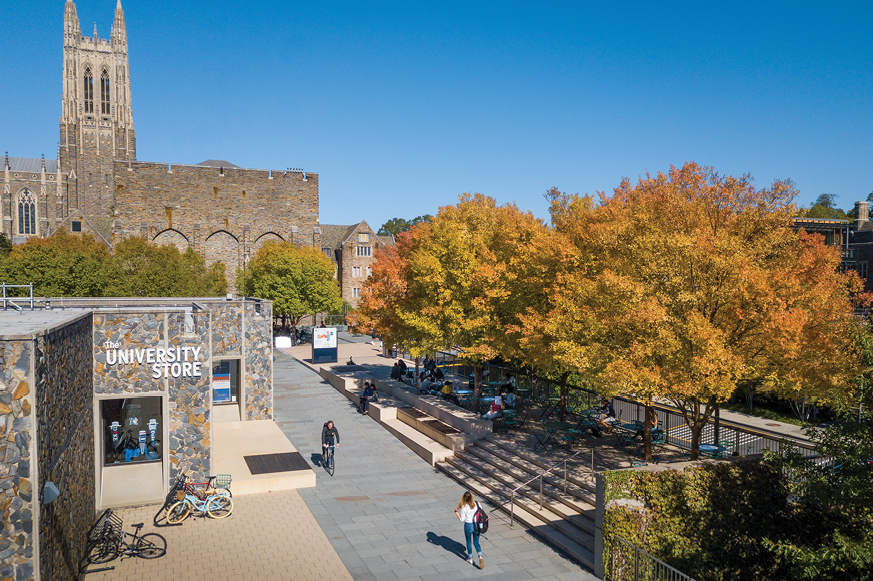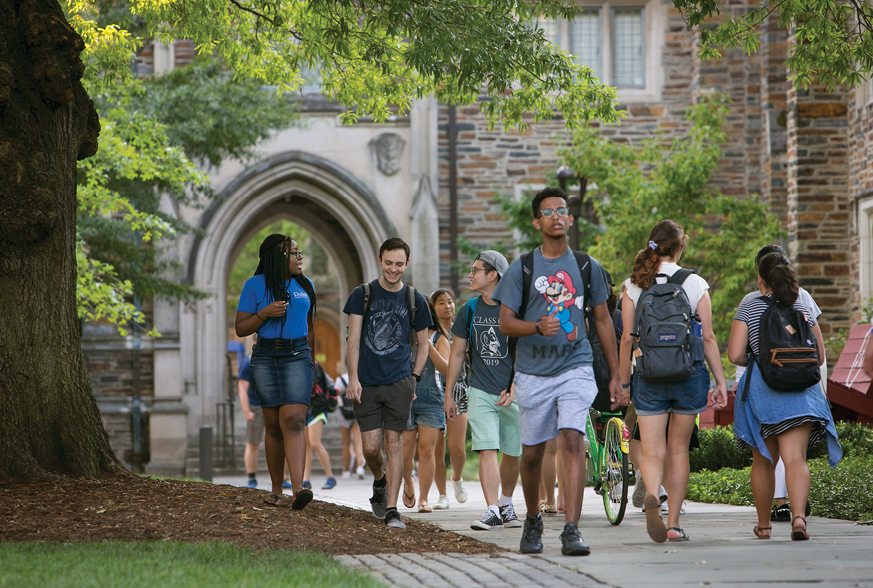- Home
- Media Kit
- Current Issue
- Past Issues
- Ad Specs-Submission
- Ad Print Settings
- Reprints (PDF)
- Photo Specifications (PDF)
- Contact Us

![]()
ONLINE

Investing in People
Editors’ Note
Vincent E. Price is the 10th President of Duke University, where he is also Walter Hines Page Professor of Public Policy and Political Science in the Sanford School of Public Policy and Trinity College of Arts and Sciences. Prior to coming to Duke, Price served as Provost of the University of Pennsylvania and was Steven H. Chaffee Professor in the Annenberg School for Communication and Professor of Political Science in the School of Arts and Sciences. He also led Penn’s role as one of the first partners with Coursera, the online open learning platform, and served as Chair of Coursera’s University Advisory Board. He came to Penn in 1998 after 11 years at the University of Michigan, where he was Chair of the Department of Communication Studies and a Faculty Associate of the Center for Political Studies. Price is a leading global expert on public opinion, social influence, and political communication. His book, Public Opinion (Sage, 1992), has been published in six languages and taught in courses around the world and he is the former editor-in-chief of Public Opinion Quarterly, the leading journal of public opinion research. Price has held visiting appointments at the University of Paris-Sorbonne and the University of Amsterdam, and has lectured widely at universities around the world. Price earned his Ph.D. and M.A. in communication from Stanford University and a B.A. magna cum laude in English from the University Honors Program at Santa Clara University.
Institution Brief
Duke University (duke.edu) is a private research university located in Durham, North Carolina and having been founded as Trinity College in rural Randolph County in 1838. Trinity moved to Durham in 1892. James Buchanan Duke, a tobacco and electric power businessman, made a transformative gift in 1924 and the institution changed its name to honor his deceased father, Washington Duke, and began constructing a new campus. Duke is now ranked among the world’s leading universities and is known for its strength in a range of disciplines, including medicine, nursing, law, the environment and the humanities.

Autumn at Duke University
How do you define what makes Duke special?
From its earliest days, Duke has always had aspirations for excellence. Terry Sanford, while he was president of the institution, referred to the “outrageous ambition” of this community, a spirit that is reflected today in an innovative entrepreneurial outlook and a willingness to make calculated bets. That has translated into a highly collaborative culture and we have more recently recognized and worked very hard to groom a certain kind of community that’s undergirded by several core values: respect and trust, inclusion, a thirst for discovery, and an aspiration for excellence in all we do.
What excited you about the opportunity to lead Duke and made you feel it was the right fit?
I had long admired Duke. As provost of the University of Pennsylvania, I had an opportunity to interact with the then-provost here at Duke and knew and respected various faculty members. Duke is small enough to maintain a strong sense of community and support an undergraduate program grounded in liberal arts, but large enough to develop and support an array of professional schools, especially a school of medicine and biomedical research and health sciences.
When this opportunity came up, unlike others that I was willing to pass on because I loved my position at the time, I thought it deserved a serious look. As I learned more about Duke, I loved what I saw. I was not all that familiar with Durham and certainly not with the changes in Durham over the past 10 to 15 years. I was convinced that this was the right time and that Duke was the right institution, and I felt that, with the community here and with my experience, we would be a very productive combination.
Will you discuss the strategic framework for Duke?
It is quite purposefully constructed to begin and end with people and to be centered around community. Duke, like most institutions of higher learning, has made substantial investments in physical infrastructure, but we have to remember that our core business is talent identification and development. We’re here to identify the brightest and most ambitious learners and bring them here so that they can study, conduct research, and try to address some of the world’s most pressing challenges.
The framework is focused on making those commitments front and center. This is not to say that we won’t make additional investments in facilities and infrastructure, but we will strive to direct our energies primarily into making sure that our core investments are always in people. That translates into caring for our faculty. That translates into financial aid. It translates into leveraging the resources that we have constructed, a wonderful student health center, investments in the arts, our fabulous Duke health offering, and pulling those together in a way that allows us to dedicate ourselves to education of the whole person – mind, body and spirit. I think that’s the core that underlies the strategic framework.
At the same time, we’re making targeted investments in science and technology to address some of the opportunities of the 21st century. On the educational front, we’ve been very creative but, like most institutions, we have yet to, in a serious way, leverage the opportunities that new technologies present to us and the liberal arts for the 21st century in a profound way.
With respect to our location here in Durham, and the Research Triangle, I feel very strongly in the opportunity for collaborative partnerships. These will help address the needs of our local community and mobilize our energies collaboratively with government leaders and community leaders. This is, again, consistent with our mission to identify and develop talent for a vibrant workforce in this region, to elevate the quality of education in the region and to address the needs of the community by making sure that we have the healthiest population we can.
Finally, with respect to our global network of Duke alumni, over the past century we have invested in building and sending out into the world these fabulous Duke alumni, and we now have close to 200,000 alumni of Duke University. The world is changing. The demands for adaptability and continuing education are growing day by day. The opportunity to think deeply about lifelong education and commit to our alumni that we’ll always be there for them, while we invite them to be part of this learning opportunity and this discovering opportunity, I think is very exciting.
These are ways in which Duke can step forward and take real leadership as we try to redefine, in many respects, higher education for the 21st century.

Students on the campus of Duke University
How critical is it to build a culture within the university that honors and appreciates diversity and inclusion?
It is essential. Coming back to our core mission of identifying and developing human talent, we overlook, as a society, vast reservoirs of human talent that go undeveloped because of a lack of resources, a lack of attention, and a lack of fairness. As we think about how we can address the challenges of society and how we can be better at our educational mission, it demands that we take a very broad view of opportunity and open ourselves to new perspectives. Diversity brings with it a wide variety of perspectives, and when it comes to problem solving, one of our greatest shortcomings tends to be a certain kind of myopia, a failure to see things from a longer distance or difficulty of seeing something from multiple angles.
If we’re going to do our teaching well and if we’re going to do our research well, it demands that commitment to diversity. We have to do it in a way that deeply values human potential, it has to be grounded in respect and trust, and that’s where inclusion really steps forward, in my view. It’s also grounded in a sense of responsibility. We’re an institution with tremendous resources. We have bright students and faculty. We have a wonderful staff that is dedicated to doing the very best that they can. We can’t squander that. It’s important to share the opportunities that we’re creating as broadly as we possibly can.
Do you feel that community engagement and addressing major societal issues is a responsibility of leading institutions and universities today?
I do think it’s a responsibility. In the case of this institution, it’s one of the reasons we were founded. Trinity College, from which we grew Duke University, was established early on as a very rudimentary educational institution, but clearly to advance the regional economy, to educate the workforce, and to bring together largely agricultural communities. Then, when Duke University was created in 1924, it was expressly to help develop the region. This university was founded alongside a separate foundation – The Duke Endowment – which exists for the purpose of advancing healthcare in the region, promoting education, promoting the health and welfare of the community, and assisting the rural church.
These missions are consistent with our founding goals, and we’re a problem-solving community. We’re here to discover and learn new things. We’re wonderfully equipped to solve problems. We’re perhaps less well equipped to identify the right problems to address, and that requires a conversation with people outside the university, understanding their needs, their wants, their desires, and thinking about how we, after listening carefully, might be able to help and how we can learn from them as much as they learn from us. This is not an attempt by an institution to swoop in and try to solve other people’s problems. It’s part of a deep partnership that starts with understanding other people’s needs and engaging with them and being creative about how we resolve them.
Did you know early on that education was where you wanted to focus your efforts and spend your career?
Yes and no. I fell in love with universities the minute I stepped onto a campus to study as a student. I’ve had the great fortune to be surrounded by fabulous students and faculty members on multiple campuses around the country. I also found, as I burrowed into my own research and my own teaching, that it’s a very collaborative exercise.
I never shied away from administrative opportunities. I became a department chair. I became very engaged in the faculty senate at the University of Pennsylvania. It felt natural, but I would not have predicted this particular trajectory because it was something that opened up over the course of time.
Having said that, I did have one startling experience as I was cleaning materials out of my home in preparation for a move, when I came across my graduate school application. I have no idea why I even held onto it, but in the application essay that I wrote, I mentioned at that point in time that I liked administrative work and that, at some point, I might be a dean or a provost. I’m not sure I fully understood what a provost was at that point in time, to be honest. I must have had some hint of leaning in this direction, but I had no idea at the time.![]()